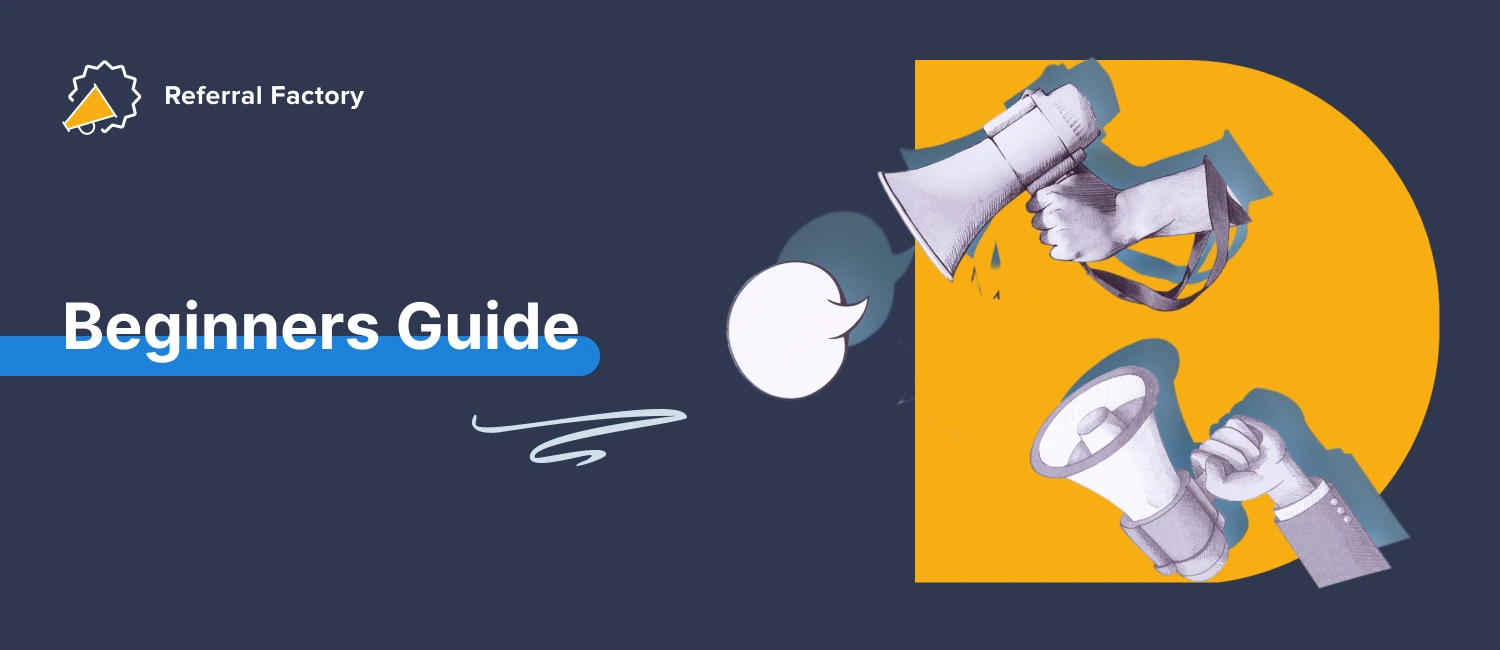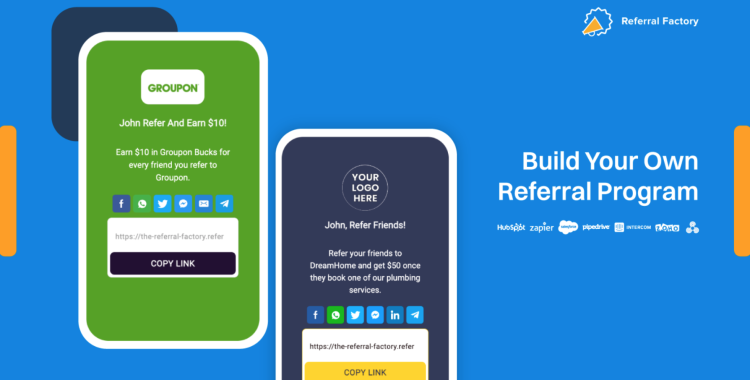Getting Started With Referral Software: Beginners Guide
Are you a digital marketer or a small business owner seeking ways to enhance your customer acquisition and lead generation efforts? Look no further than referral program software, a powerful solution that can revolutionize your business. With referral marketing, you can leverage the power of satisfied customers to become enthusiastic brand advocates who refer their friends and family, leading to increased sales and revenue. In this comprehensive beginner’s guide, we’ll cover everything you need to know about referral marketing and its various applications, including customer referral programs and partner programs. Discover the importance of referral software (SaaS) and how to select the right solution for your referral tracking needs. We’ll even reveal the highest-rated referral software based on G2 reviews! Implement referral marketing effectively and unlock its full potential for your business.
Table of Contents
What is Referral Marketing?
Referral marketing is a powerful strategy that leverages the power of word-of-mouth to drive new customers to your business. It’s all about incentivizing your existing customers to spread the word about your products or services to their friends and family. By offering rewards or discounts for successful referrals, you can tap into the trust and credibility that your happy customers have built with their network. Referral marketing is a cost-effective way to acquire new customers and build brand loyalty, and it can be a game-changer for your business. So if you’re looking to grow your customer base and boost your bottom line, it’s time to start incorporating referral marketing into your overall marketing strategy.
The benefits of referral marketing include increased customer acquisition, improved customer retention rates, and better brand awareness through word-of-mouth marketing. Additionally, implementing a clear goal for your referral program can help you measure its success and make data-driven decisions on how to improve it over time.
Benefits of Implementing Referral Marketing
Using the best referral software can lead to numerous benefits for businesses looking to improve their marketing efforts. One of the main advantages is increased brand awareness, as satisfied customers are more likely to share their positive experiences with others. This can help expand a company’s reach and introduce new potential customers to the brand. Referral marketing can also be more cost effective than paid advertising (PPC) with a greater likelihood for conversion. By leveraging existing customer relationships, companies can save on acquisition costs and allocate those resources towards other areas of growth. Many people ask: how can referral software help increase customer loyalty? Implementing referral marketing can also result in increased retention and customer loyalty, which, in turn, improves brand advocacy.
Increased Brand Awareness

Leveraging the power of word-of-mouth marketing is a great way to increase brand awareness and reach new audiences through existing customers. By encouraging satisfied customers to share their positive experiences with others, your brand can gain more exposure and credibility. In addition, existing clients or supporters will naturally have connections with individuals from the same demographic who share similar interests. That means that, unlike paid advertising, which often relies on faulty algorithms for targeting the right audience, referral marketing naturally targets the market that best fits your offering.
Cost-Effective Marketing

In today’s competitive market, eliminating the need for expensive paid advertising campaigns has become a necessity. Referral software makes it possible to maximize ROI by only paying for whatever you consider a successful referral. By incentivizing existing customers to spread the word about your brand, referral programs can lower customer acquisition costs and increase revenue. This cost-effective marketing strategy also improves brand trust and loyalty, as customers are more likely to trust recommendations from friends and family over traditional advertisements, which naturally means more leads will convert.
Higher Conversion Rates

Referral marketing boasts a superior conversion rate compared to traditional forms of advertising due to its unique ability to harness the power of personal recommendations. In today’s saturated advertising landscape, where consumers are bombarded with countless messages, referral marketing stands out as a beacon of trust and authenticity. When individuals receive a recommendation from a friend or acquaintance, it carries a weight of credibility that surpasses typical advertising methods. This is because the recommendation comes from a trusted source, bypassing initial skepticism and establishing a genuine connection. By leveraging the innate power of personal endorsements, referral marketing has the potential to captivate audiences, ignite curiosity, and inspire a strong desire to explore the recommended product or service. In other words, referral marketing brings in warmer leads than any other form of advertising.
Improved Brand Advocacy

Fostering long-term relationships with loyal customers is crucial for improving brand advocacy. By offering personalized experiences and exclusive offers, you can incentivize your customers to remain loyal to your brand. This not only increases customer satisfaction but also helps in retaining them for the long term. In other words, referral marketing plays a crucial role in customer retention by reinforcing customer loyalty. When customers are actively involved in recommending a brand, they develop a deeper sense of commitment and ownership. They become more invested in the brand’s success, fostering long-term relationships and reducing the likelihood of churn. By empowering customers to become brand ambassadors, referral marketing not only boosts brand advocacy but also fosters customer retention, ultimately driving sustainable growth for businesses.
What to Consider For Your Referral Marketing Strategy
There are several things to consider about your referral marketing strategy before you start deciding which referral marketing software would be best suited to your goals. When choosing referral software, consider who you will ask to refer, whether you will reward people for referring and whether you will incentivize the people being referred with a special offer or exclusive benefit. You should also think about your broader marketing strategy and digital marketing toolkit, and how referrals can be implemented to compliment your lead generation. With the right referral marketing strategy in place, you can start harnessing the power of word-of-mouth to grow your business and reach new customers.
Identify Your Goals
When choosing the right referral software, it’s important to identify your goals and determine what you want to achieve with a referral program. Are you looking to increase customer loyalty or acquire new customers? Knowing your objectives will help narrow down the options and find a software that aligns with your needs. Increasing customer acquisition, boosting customer retention and loyalty, and driving website traffic and engagement are some of the main goals that referral software can help you achieve. By setting specific targets for each objective, you can design a referral program that aligns with your business goals. For instance, if your aim is to increase customer acquisition through referrals, you might offer incentives or discounts to customers who refer new leads. If boosting retention is a priority, consider offering exclusive rewards or bonuses for frequent advocates.
Moreover, driving website traffic and engagement can be achieved through sharing referral links or referral codes on social media platforms or incorporating share buttons into emails. The more visible your program is to potential advocates, the more likely they are to participate actively in it. Ultimately identifying clear objectives will enable you to develop an effective strategy which delivers tangible results for your business while providing value-added benefits for participants in the referral program.
Choose Your Referral Target

In its simplest form, referral marketing software can be implemented to prompt anyone to refer people in their network to your business or brand. However, it’s important to understand the various applications of the software for different target markets or audiences. In other words, ask yourself: who do I want to ask to refer to their friends. Here are some referral program examples by type:
- Business-to-Consumer (B2C), or simply, Customer Referral Marketing is a strategy in which businesses encourage their existing customers to refer new customers to their products or services. It leverages the power of word-of-mouth marketing by incentivizing satisfied customers to share their positive experiences with their friends, family, and social networks. B2C referral marketing programs typically offer rewards or incentives, such as discounts, credits, or exclusive perks, to customers who successfully refer others. This approach can be highly effective in driving customer acquisition, as referrals from trusted sources often carry more weight and influence potential customers’ purchasing decisions. B2C referral marketing enables businesses to tap into their existing customer base to generate new leads and build brand loyalty.
- Partner Referral Marketing typically involves asking other businesses to refer other businesses to their customers or businesses in their network (often called B2B referral program or business-to-business referral marketing). Partners may also collaborate with you to cross-promote each other’s products or services.
- Influencer Referral Marketing means asking social media personalities to endorse your product or service to their followers.
- Affiliate or Advocate Referral Marketing is when people or organizations promote your product or service in exchange for a fixed or variable commission. Pro tip: you can use referral software to create affiliate links — it typically comes in way cheaper than specialized affiliate software!
- Employee Referral Marketing where your staff refer your business or brand to customers. Employee referral programs can also be implemented to aid in recruitment and hiring by asking employees to share vacancies with people in their networks.
Select Your Rewards and Incentives
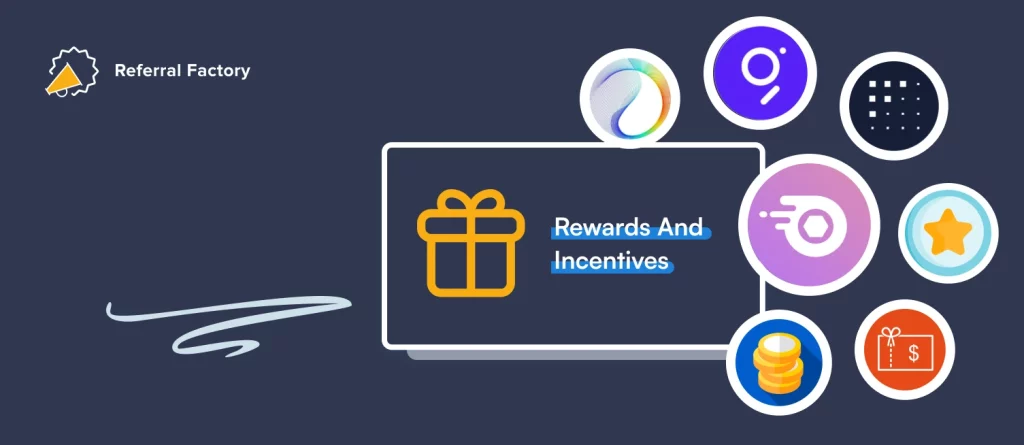
Referral reward-based referral programs offer monetary or other benefits for successful referrals, while non-reward-based referral programs rely on the user’s motivation to refer others.
When planning your referral marketing—and choosing referral marketing software—it’s also important to consider whether your referral program will include rewards and or incentives.
- Double-Sided or Single-Sided Rewards. In addition to considering whether you will reward referrers, think about how you might incentivize their friends or network by including a special offer of some sort. In referral marketing, these two options are often differentiated by the terms single-sided and double-sided. Double-sided rewards are incentives given to both the referrer and the person they refer. For example, you might offer a discount to the referrer and a discount to the new customer. This type of reward is great for encouraging customers to refer their friends and family because everyone benefits. Single-sided rewards, on the other hand, only reward the referrer. For example, you might offer a discount or a gift card to the referrer for every successful referral. This type of reward is less expensive and can still be effective in encouraging referrals. When deciding between double-sided and single-sided, it’s important to consider your budget and your goals. Double-sided rewards can be more expensive, but they can also be more effective in generating referrals. Research shows that people are more likely to refer their friends if they can give them a good offer [could link to blog here]. Single-sided rewards might be less expensive, but they may not be as effective in encouraging referrals.
- Standard, Stacked, or Tiered Rewards. In referral marketing, different reward structures can be implemented to incentivize customers and encourage them to refer others. Here are the key differences between standard, stacked, and tiered rewards. In a standard reward structure, customers receive a fixed and consistent reward for every successful referral they make. For example, a business may offer a $10 discount or a gift card for each referred customer who makes a purchase. This straightforward approach ensures simplicity and ease of implementation, as the reward remains the same regardless of the number of referrals made. Stacked rewards provide an escalating incentive for customers based on the number of successful referrals they generate. As customers refer more individuals, their rewards increase incrementally. For instance, the first referral may earn them a $10 discount, the second referral could earn them a $20 discount, and so on. This structure aims to motivate customers to continue referring by offering greater rewards as they achieve specific referral milestones. Tiered rewards, also known as multi-tiered rewards, involve offering different levels or tiers of rewards based on the number or quality of referrals made by customers. Customers progress through various tiers as they refer more individuals or achieve specific goals. Each tier offers increasingly valuable rewards, providing a sense of achievement and recognition for their referral efforts. For instance, the first tier may offer a small discount, while the second tier could include a larger discount or a free product. This structure encourages customers to strive for higher tiers and can foster healthy competition among advocates. The choice of reward structure depends on various factors, such as the desired level of customer engagement, the target audience, and the specific goals of the referral marketing campaign. Standard rewards are straightforward and easy to understand both for you and for your users, while stacked and tiered rewards can create excitement and a sense of progression for customers, motivating them to refer more and achieve higher levels of rewards.
How Does Referral Software Help Businesses?
As a digital marketer, your pursuit of enhancing customer acquisition and boosting sales requires effective strategies. Referral marketing stands out as a powerful approach to achieving these goals, but managing it manually can be arduous, leading to customer dissatisfaction and depleting valuable staff resources. This is precisely where referral software proves invaluable.
Referral software should help you:
- track the relationship between referrers and their friends
- make it easy for your advocates to refer their friends
- provide a seamless and personalized introduction to your business or brand
- provide detailed analytics and metrics behind your referral program, giving you valuable insights into what’s working and what’s not
- manage and even automatically issue rewards
With this free tool, you can build a referral program for your brand in just one click
With these tools at your disposal, you can leverage the power of satisfied advocates to grow your business in an effective way that keeps loyalty high among current users while attracting new ones. In other words, referral software can save you time and effort while delivering measurable results.
How To Choose The Right Referral Software

When it comes to implementing a successful referral marketing strategy, choosing the right referral marketing software is paramount. With a multitude of options available, selecting the software that aligns with your business needs and objectives can be a daunting task. However, by considering the most important factors and evaluating your requirements, you can make an informed decision that sets the stage for effective referral marketing campaigns. In this section, we delve into the crucial aspects to consider when selecting referral marketing software, equipping you with the knowledge to make a confident and well-informed choice for your business.
Features and Functionality
When selecting a referral marketing software for your business, it’s crucial to consider the features and functionality it offers.
Tracking Capability

When evaluating referral marketing software, the referral tracking capabilities are crucial factors to consider. Effective tracking enables you to monitor and measure the success of your referral program. Look for software that provides robust tracking capabilities, allowing you to accurately track the relationship between referrers and their referred friends. This includes capturing and attributing referrals to specific advocates, tracking the progress of referrals through the conversion funnel, and recording the resulting conversions or purchases. The software should provide clear visibility into referral activities, enabling you to assess the performance of your referral program and identify the most successful advocates. Additionally, consider whether the software offers advanced tracking features such as tracking referral sources, referral channels, and the ability to integrate with web analytics tools. By choosing referral marketing software with comprehensive tracking capabilities, you can gain valuable insights into the effectiveness of your referral program, make data-driven decisions, and optimize your strategies for maximum results.
Ease of Use And User Interface
When evaluating referral marketing software, the ease of use and user interface are crucial factors to consider, ensuring a seamless experience for both those referring and being referred to your business. A user-friendly interface simplifies the referral process, making it effortless for advocates to refer their friends. Intuitive navigation, clear instructions, and straightforward referral submission forms are essential elements of an easy-to-use software. Additionally, the software should provide a smooth and personalized experience for those being referred. A well-designed user interface should create a positive first impression, clearly communicating the benefits of your business and guiding new customers through the referral process. By prioritizing an intuitive and user-friendly design, referral marketing software can enhance engagement and participation, making it convenient for both advocates and their friends to engage with your brand.
Customization And Flexibility
When assessing referral marketing software, ask: what options are available for customizing referral software? The ability to customize the software allows you to tailor the referral program to your specific brand identity and target audience. Look for a provider that allows you to brand your referral program with your company logo, colors, and messaging. This will help to create a seamless experience for your customers and reinforce your brand identity. Next, consider the incentives you will offer to those who refer new customers to your business. Customizable options may include setting the reward amount, choosing how the rewards are delivered, and deciding whether to offer a one-time reward or a recurring reward. Customization allows you to tailor the software to accommodate various referral programs, such as customer-to-customer, business-to-business, partner referral marketing, affiliate and influencer referral marketing, and employee referral marketing. Additionally, flexibility is vital to adapt the software to the specific requirements of different referral marketing approaches. This includes the ability to scale the program, modify reward structures, and customize settings to suit the nature of the referral relationship. By evaluating the customization and flexibility of referral marketing software across different referral types, you can ensure that the software aligns with your specific needs and supports the success of diverse referral marketing strategies.
Integrations
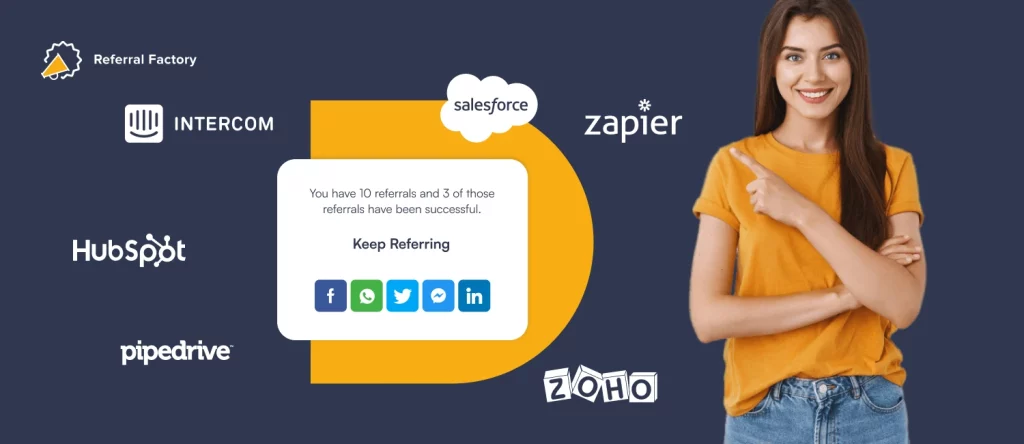
When evaluating referral marketing software, integration with other business tools emerges as a crucial factor to consider. Seamless integration allows for the efficient flow of data and facilitates a cohesive marketing strategy. Look for software that offers integration with your existing customer relationship management (CRM) system, email marketing platform, and other relevant tools. This integration ensures that customer data, referral information, and campaign analytics can be synchronized and shared effortlessly between systems. By integrating referral marketing software with your existing business tools, you can centralize your marketing efforts, streamline workflows, and gain a holistic view of customer interactions. This facilitates targeted and personalized referral campaigns, enhances customer tracking and segmentation, and maximizes the overall effectiveness of your marketing efforts. Therefore, carefully assessing the integration capabilities of referral marketing software is essential for achieving seamless collaboration across your marketing ecosystem and driving impactful results.
Analytics
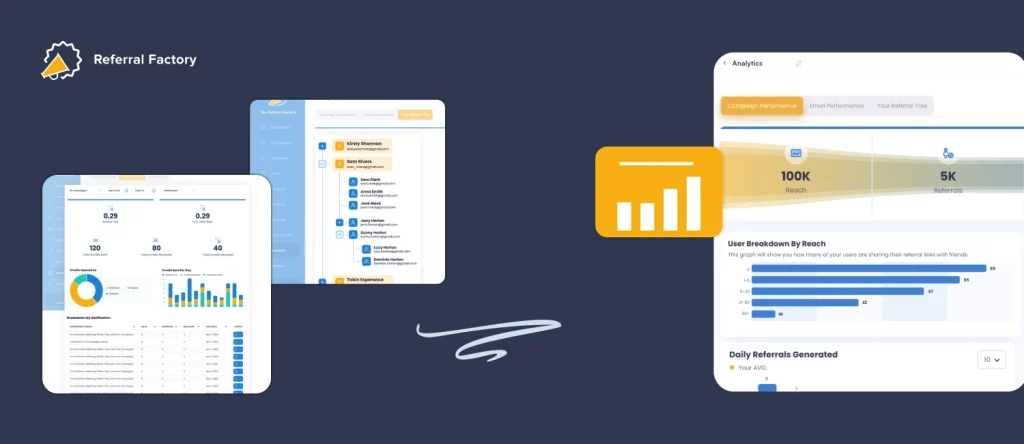
When assessing referral marketing software, the analytics capabilities are vital factors to consider. A robust analytics suite empowers you to gain valuable insights into the performance of your referral program. Look for software that provides comprehensive analytics capabilities, including metrics such as referral conversion rates, customer acquisition costs, and the lifetime value of referred customers. It should offer detailed tracking of referral activities, allowing you to monitor the effectiveness of different referral channels, identify top-performing advocates, and measure the impact of your referral program on overall business goals. Moreover, the software should provide intuitive reporting features, enabling you to generate customizable reports and visualize data in a meaningful way. By choosing referral marketing software with robust analytics capabilities, you can make data-driven decisions, continuously improve your referral program, and maximize the ROI of your referral marketing efforts.
When considering whether referral marketing software should offer automated A/B tests, it is important to assess the scale and size of your datasets. If you are working with massive datasets, automated A/B testing can be a valuable tool for efficiently analyzing and optimizing your referral campaigns. However, for smaller businesses with limited data, the benefits of automated A/B testing may not justify the additional complexity and resources required. It is crucial to evaluate your specific needs and resources to determine if automated A/B testing is a necessary feature for your referral marketing software.
Budget
Budget is another crucial factor when selecting referral software. While some may have advanced features, they could come at an expensive cost. Consider how much you’re willing to spend on this marketing channel and ensure that the chosen software provides enough value for its price. It’s also worth noting that some platforms offer free trial periods or basic plans with limited functionalities if budget constraints are tight.
Comparing pricing plans from multiple providers is the first step in implementing referral software, as it allows you to choose a plan that best fits your budget and needs. Additionally, calculating the potential ROI of implementing referral software will help you determine if it’s a cost-effective investment for your business. By evaluating the cost-effectiveness versus other marketing strategies, such as paid advertising or social media campaigns, you can make an informed decision on how to allocate your resources.
As you consider your budget for referral software, keep these factors in mind:
- Compare pricing plans from multiple providers
- Calculate potential return on investment (ROI)
- Evaluate cost-effectiveness versus other marketing strategies
By taking these steps into consideration, not only will you be able to find affordable referral software solutions but also understand its contribution towards achieving greater customer acquisition and retention.
How to Implement Referral Software
Referral software can be a powerful and cost-effective tool for online marketers looking to grow their customer base. To implement referral software, start by setting up your program with clear goals and incentives that align with your business objectives. Choose a platform that is easy to use, provides accurate tracking data, and integrates seamlessly with your existing marketing channels.
Once your program is set up, promote it through targeted messaging across all relevant channels such as email campaigns or social media posts. Make sure to highlight the benefits of participation both for the referrer and the referred customer.
Lastly, track and analyze results regularly using metrics such as conversion rates or ROI to optimize your program over time. With these steps in place, you’ll be well on your way to harnessing the power of referral marketing through effective implementation of referral software.
Set Up Your Program

To set up your referral program, start by carefully selecting the right referral software for your business needs. Consider which features are important to you and what type of rewards or incentives you want to offer referrers and their friends. Once you have chosen a platform, customize your program’s landing page, messaging, and branding to match your company’s identity.
When it comes to deciding on rewards or incentives for participants in your referral program, consider offering something that provides real value without being overly expensive. For example, exclusive access to products or services can be a powerful motivator for customers who are interested in referring others.
After choosing the right software and setting up an attractive incentive structure, make sure that everything is branded consistently across all marketing materials related to your referral program. This includes customizing the look and feel of any landing pages used in promoting the campaign as well as crafting messaging tailored specifically towards new referrals. By following these steps diligently from beginning-to-end when setting up a new referral campaign – marketers can ensure that they have laid a solid foundation for success!
Promote Your Program
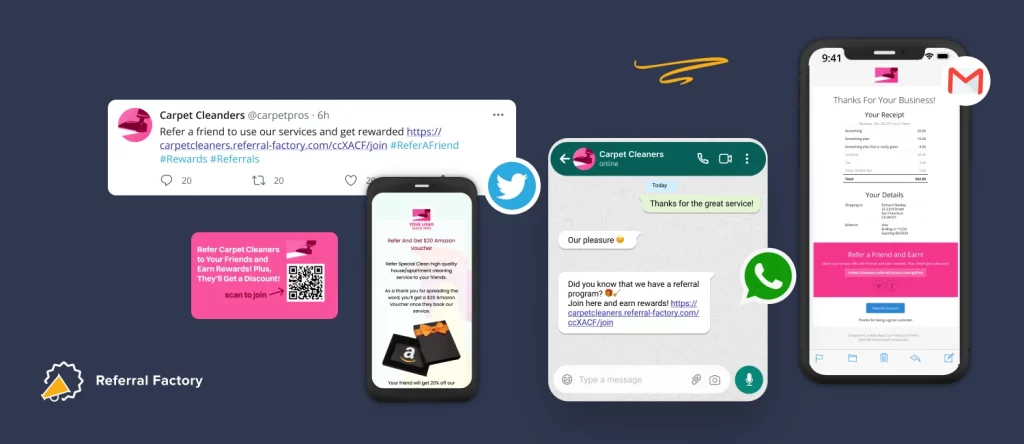
Leverage the power of email marketing campaigns to promote your referral program. By creating a compelling and engaging message, you can attract potential customers and incentivize them to refer their peers to your business. Strategize on targeted email lists, personalize emails with their name, and include an easy-to-follow call-to-action (CTA) button directing them towards your referral program.
Social media is another powerful tool that can be used to spread awareness about your referral program. Utilizing relevant hashtags and collaborating with influencers in the same industry can increase visibility and traction for your brand. Encourage followers on platforms such as Twitter, Instagram, or LinkedIn to share information about the rewards of referring friends or colleagues.
Incorporating a CTA button or pop-up on key pages of your website can prompt visitors to check out more details about signing up for referrals. Consider placing it prominently on landing pages where visitors are most likely making decisions regarding purchasing from you or not; this could be anywhere from product pages through service descriptions all the way down into checkout forms themselves depending upon what’s applicable within each situation!
Track and Analyze Results
When it comes to tracking and analyzing results with referral software, there are several important metrics to keep an eye on. By monitoring metrics such as clicks, conversions, shares, and revenue generated from referrals using analytics tools integrated into the software solution chosen in Step One, online marketers can gain valuable insight into the effectiveness of their referral program.
To optimize incentives and adjust future campaign efforts accordingly, it’s also crucial to analyze customer behavior patterns over time. This analysis will provide useful insights that can be used to fine-tune your overall marketing strategy. Finally, consider leveraging A/B testing tactics when running promotions via email or social media for even more precise targeting and optimization.
Which referral software has the highest rated review score on G2?
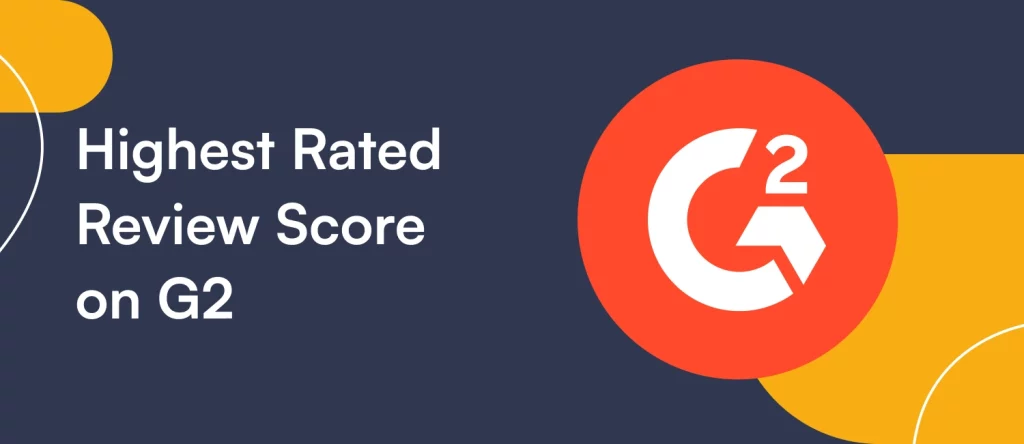
Here are the five best-rated referral marketing software according to reviews on G2:
- With a review score of 4.9 out of 5 on G2, Referral Factory has garnered positive feedback from its users. The most praised features of Referral Factory include its ease of use, customizable referral programs, and robust tracking and analytics capabilities, allowing businesses to implement and optimize successful referral campaigns while gaining valuable insights into their performance.
- Birdeye also ranks high among referral software options on G2, with a rating of 4.8 out of 5. The most praised features of Birdeye include its user-friendly interface, robust review management capabilities, and the ability to collect and monitor customer feedback across various channels, helping businesses enhance their online reputation and deliver exceptional customer experiences.
- Extole is a referral marketing software that has received positive reviews from users, earning a review score of 4.3 out of 5 on G2. Users have praised Extole for its robust features and versatility in creating and managing referral campaigns. The most praised features of Extole include its advanced customization options, seamless integration with various platforms, and comprehensive reporting and analytics capabilities that provide valuable insights into the performance of referral programs.
- With a review score of 4.7 out of 5 on G2, ReferralCandy has received positive feedback from its users. The most praised features of ReferralCandy include its seamless integration with e-commerce platforms, customizable referral programs, and robust tracking and analytics capabilities, enabling businesses to effectively implement and manage referral campaigns while gaining valuable insights into their performance.
- FriendBuy is a referral marketing software that has garnered positive reviews from users, earning a review score of 4.4 out of 5 on G2. Users have praised FriendBuy for its ease of use and seamless integration with e-commerce platforms, making it simple to implement and manage referral programs. The most praised features of FriendBuy include its robust tracking and analytics capabilities, customizable referral program options, and excellent customer support.
- With a review score of 4.4 out of 5 on G2, Influitive has received positive feedback from its users. The most praised features of Influitive include its user-friendly interface, gamification elements, and the ability to empower and mobilize brand advocates to promote and amplify the company’s message, fostering strong customer relationships and driving organic growth.
- Referral Rock is a referral marketing software that has received positive reviews from users, earning a review score of 4.0 out of 5 on G2. Users have praised Referral Rock for its ease of use and user-friendly interface, making it simple to set up and manage referral programs.
Referral Factory
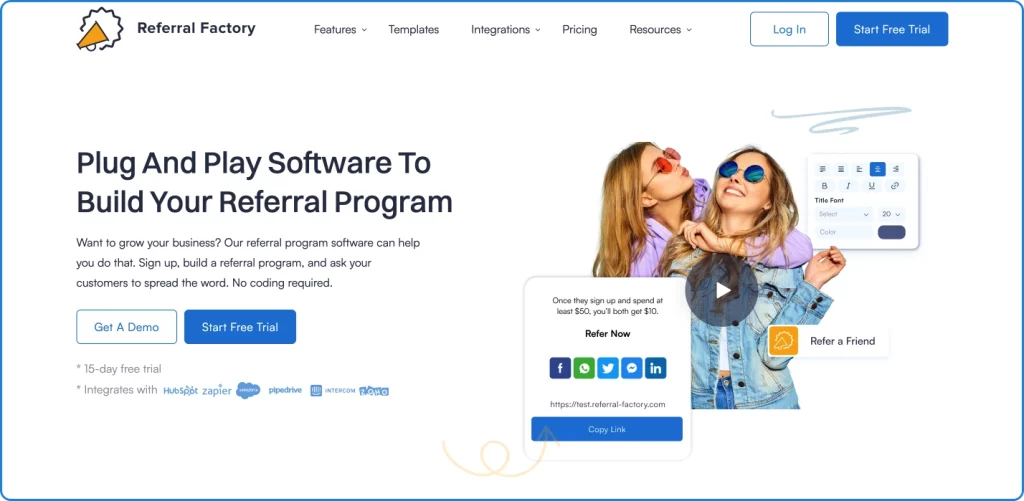
Referral Factory is a powerful referral software that provides an all-in-one solution to create and manage successful referral programs. With Referral Factory, you get access to key features like customizable reward systems, automated email campaigns, and detailed analytics. The platform also offers flexible pricing plans based on the size of your business so that you can choose the one that best fits your needs.
In addition to its built-in features, Referral Factory offers seamless integration with other marketing tools like CRM platforms and social media accounts. This means you can leverage existing customer data and expand your reach by integrating with popular marketing channels. With Referral Factory’s user-friendly interface and robust capabilities at your fingertips, it’s never been easier or more effective to launch a referral program for your business.
Birdeye
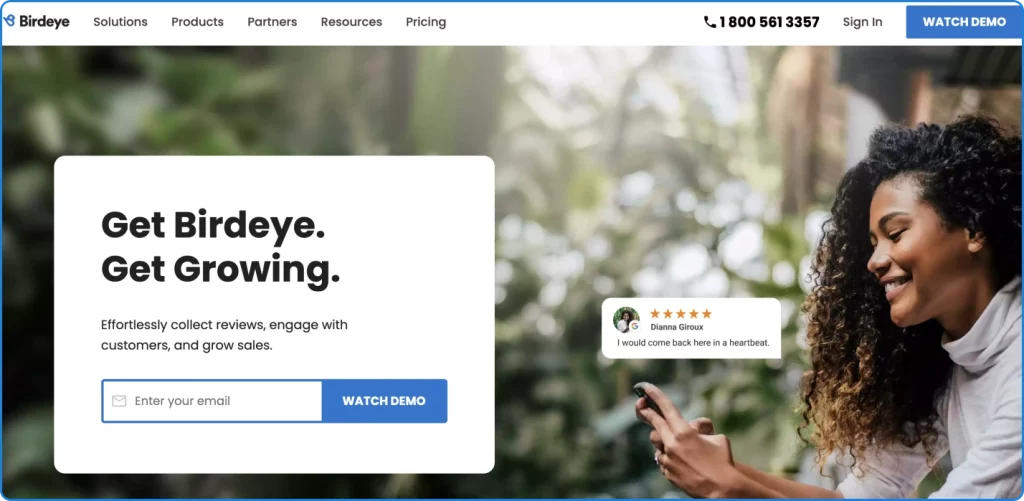
Birdeye is a comprehensive referral marketing software platform designed to help businesses manage their online reputation, collect customer feedback, and generate positive reviews. The software offers a range of features that enable businesses to effectively monitor and improve their online presence.
One of the notable advantages of Birdeye is its user-friendly interface, which makes it easy for businesses to navigate and utilize the platform. The software also excels in review management, allowing businesses to collect and monitor customer reviews from various online channels. Birdeye provides tools for reputation management, including responding to reviews, analyzing sentiment, and generating reports, helping businesses maintain a positive online image.
However, some users have reported that the setup process can be complex and time-consuming, which may require additional support from the Birdeye team. Additionally, while the software offers robust features for review management, some users have found the reporting capabilities to be limited, wishing for more advanced analytics and insights.
Extole
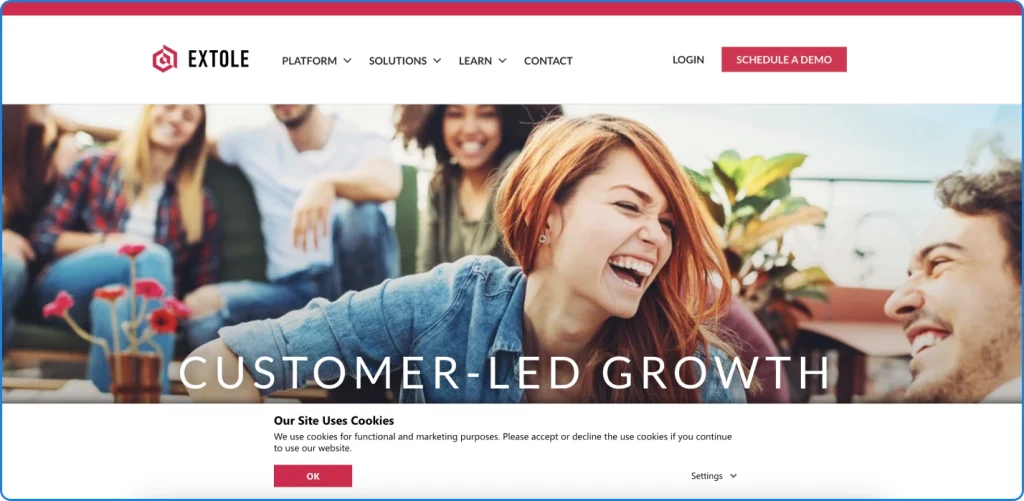
Extole is a referral marketing software that enables businesses to create and optimize their referral programs. It offers a range of features designed to drive customer referrals and generate new leads.
One of the notable advantages of Extole is its robust customization options, allowing businesses to tailor their referral programs to align with their brand and target audience. Users have praised Extole for its flexibility and versatility in creating engaging referral campaigns. The software also provides seamless integration with various platforms, making it easy to incorporate referral marketing into existing workflows.
However, some users have mentioned that the initial setup and configuration of Extole can be complex and require technical expertise. Additionally, pricing may be a consideration for smaller businesses, as Extole is generally geared towards larger enterprises with more extensive referral needs.
ReferralCandy
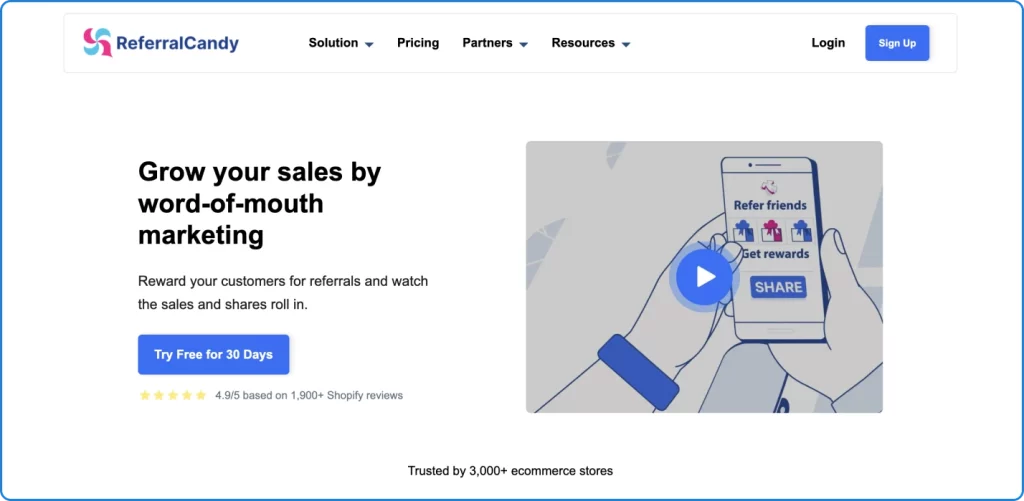
ReferralCandy is a referral marketing software designed to help businesses implement and manage their referral programs. It offers a range of features to incentivize customers to refer others and generate new leads.
One of the notable advantages of ReferralCandy is its seamless integration with popular e-commerce platforms, making it easy for businesses to set up and launch their referral programs. Users have praised ReferralCandy for its customizable referral programs, allowing businesses to tailor incentives and rewards to suit their specific needs and target audience. The software also offers robust tracking and analytics capabilities, providing valuable insights into the performance of referral campaigns.
However, some users have mentioned that the software’s pricing structure can be quite expensive, particularly for businesses with a high volume of referrals or smaller budgets. Additionally, while ReferralCandy integrates well with e-commerce platforms, some users have requested more flexibility in terms of customization options for the referral program’s appearance and messaging.
FriendBuy
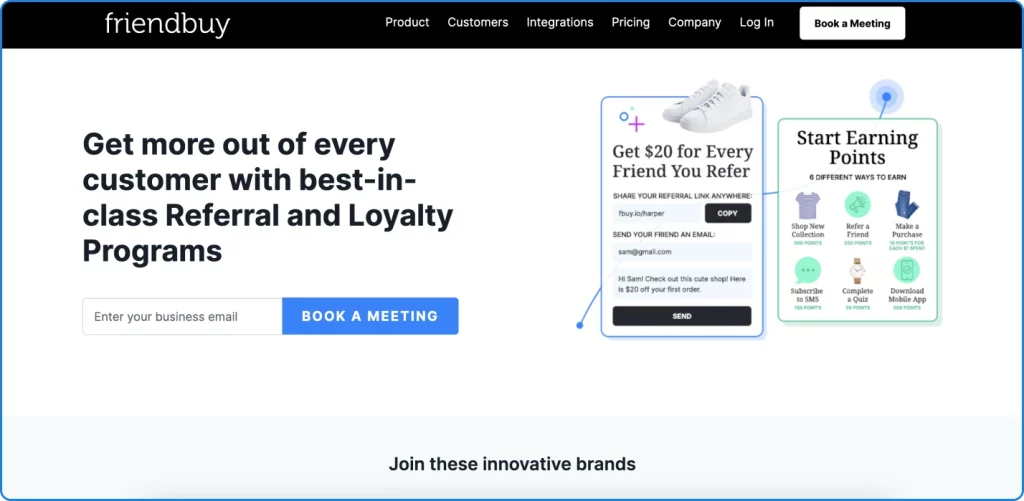
FriendBuy is a referral marketing software that specializes in helping businesses implement and optimize their referral programs. It offers a wide range of features designed to incentivize customers to refer others and drive new leads.
One of the notable advantages of FriendBuy is its seamless integration with popular e-commerce platforms, making it easy for businesses to set up and launch their referral programs. Users have praised FriendBuy for its user-friendly interface and intuitive dashboard, which streamline the process of managing and tracking referral campaigns. The software also provides robust analytics and reporting capabilities, allowing businesses to gain valuable insights into the performance and effectiveness of their referral programs.
However, some users have mentioned that the pricing of FriendBuy can be on the higher side, particularly for businesses with larger customer bases or higher referral volumes. Additionally, while FriendBuy offers extensive customization options, some users have found the setup process to be slightly complex, requiring technical knowledge or assistance.
Influitive
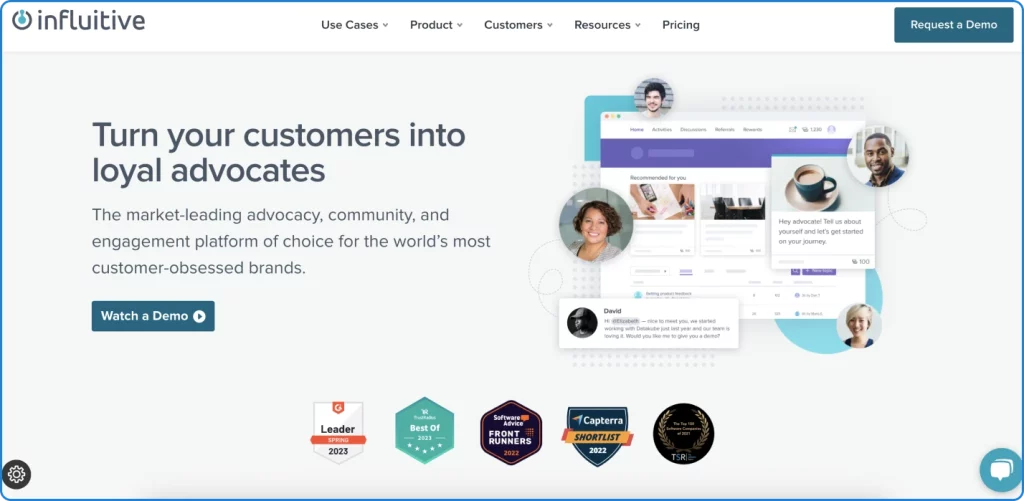
Influitive is a referral marketing software platform that focuses on advocate marketing and customer engagement. It provides tools to mobilize and empower brand advocates, encouraging them to promote a company’s message and drive organic growth.
One of the notable advantages of Influitive is its gamification elements, which make the advocacy process engaging and enjoyable for participants. Users have praised Influitive for its ability to create a sense of community and foster strong relationships with brand advocates. The software offers various activities and challenges that incentivize advocates to refer others, share content, and provide feedback.
However, some users have mentioned that the learning curve for using Influitive can be steep, especially for those who are new to advocate marketing. Additionally, while Influitive provides tools for managing and tracking advocate activities, some users have found the reporting and analytics features to be limited, desiring more advanced metrics and insights.
Referral Rock
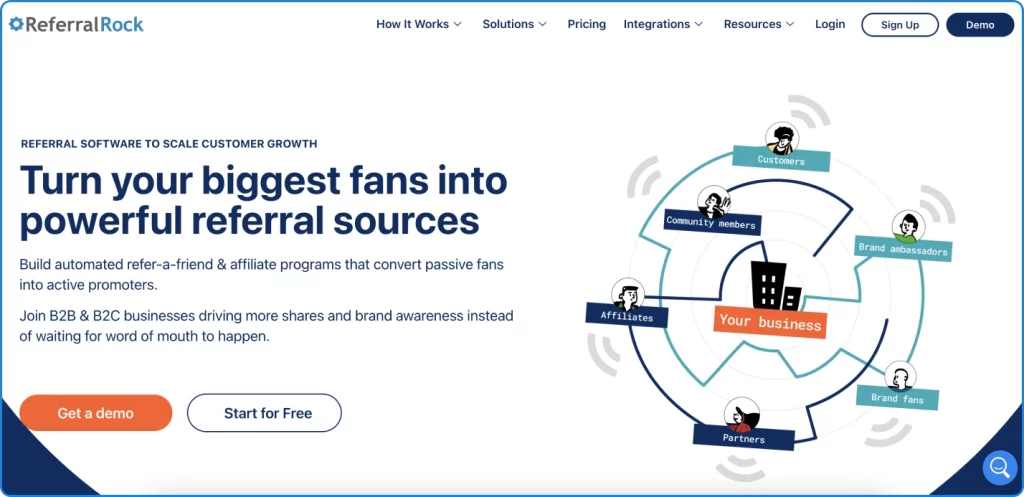
Referral Rock is a referral marketing software that specializes in helping businesses create and manage their referral programs. It offers a range of features to incentivize customers and advocates to refer others and drive new leads.
One of the notable advantages of Referral Rock is its ease of use, which allows businesses to quickly set up and launch their referral programs without requiring extensive technical knowledge. Users have praised Referral Rock for its intuitive interface and user-friendly dashboards, making it easy to navigate and manage referral campaigns effectively. The software also provides robust tracking and analytics capabilities, enabling businesses to track the success of their referral campaigns and gain valuable insights into customer engagement.
However, some users have mentioned that the customization options for the referral program’s appearance and messaging could be more flexible. Additionally, while Referral Rock offers integration with popular CRMs and other tools, some users have reported challenges with certain integrations and desired more seamless integration options.

